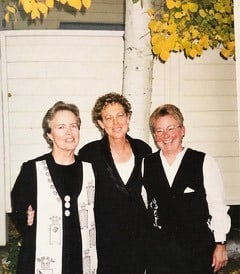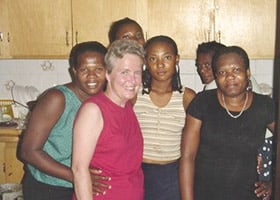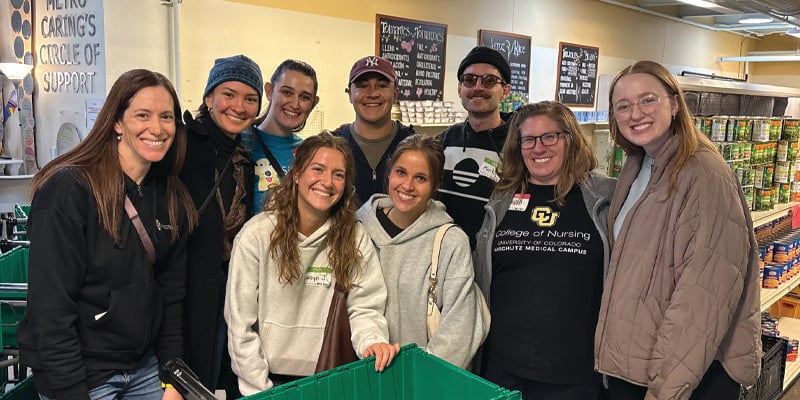Child Advocacy through Clinical Nursing
When asked how she sees herself, Dr. Lynn Howe Gilbert, PhD, CPNP, RNC, FAAN, has said that, even before nurse or teacher, her identity is primarily as a child advocate. She maintains that an important formative experience was a trip to visit many African countries emerging from colonialism with several other students from across the U.S. between her junior and senior years of high school in 1959.
She became a nurse to have a skill that would be valuable for work in Africa. After earning her Bachelor’s Degree in nursing in 1965 with a focus on pediatrics, she first worked in pediatric intensive care in Los Angeles County Hospital during the Watts riots. Not long after, she became a Peace Corps office nurse in Nigeria for two years. Following this commitment, she returned to the U.S. to pursue a degree in Public Health Nursing, Maternal-Child Health, in 1968 before returning to work in Nigeria and Ghana for nine years as a nurse, educator, and consultant. In 1978, she returned to the U.S. working for 10 years in indigent care at People’s Clinic in Boulder, Colorado, and becoming a certified Pediatric Nurse Practitioner. During her time at People’s Clinic, she made several trips to the African continent to do short-term consulting in pediatric primary care.
Child Advocacy through Teaching
Gilbert and colleagues
Her pediatric nursing career led her to pursue a doctorate in behavioral pediatrics and community child health and a teaching career at the University of Colorado College of Nursing for 19 years. While evaluating patients for cardiovascular risk factors in the university’s faculty clinical practice sites, she discovered a very high prevalence of these factors in the children there. As she focused on teaching nursing students to screen for these factors, she found that they were often struggling with calculating body mass index and evaluating blood pressures in the patients they saw.
Child Advocacy through Research
Recognizing cardiovascular risk factors in children as an important area for research, Gilbert next undertook to gather data in her clinic populations and also to assist her students in counseling the patients and their parents about these risk factors. She accepted the offer and computer expertise of her son, Kevin Gilbert, PhD, to develop an online tool that allows a patient or parent to enter family history and lifestyle data and a care provider to enter weight, height, and blood pressure. From these data, the needed calculations are done, and the provider is given a sheet with growth parameter graphs and a summary of all these data. Further development resulted in a tool to assist the provider with motivational interviewing and small step behavioral changes to address the risks. This tool has also proven itself valuable for screening for many health issues in clinics, research, and health fair settings.
Child Advocacy through Volunteerism and Politics
For over 20 years, Gilbert has served on many Boulder County and national task forces and boards, advisory and directorial, all related to child health. Also, her research on cardiovascular risks has revealed that sugar-sweetened beverage consumption is a major factor in obesity. In addition to teaching students about the importance of addressing this problem with patients, she wanted to be more productive by working for a tax on distributors of sugar-sweetened beverages in the City of Boulder, where she lives. Tax on tobacco and sugar-sweetened beverages, as well as on other things, has been shown to be an effective way of discouraging their use or consumption in many settings. She was a key figure in the initial effort by petition, then working with the city council, and finally in the election campaign that successfully passed the tax initiative in 2016. She also played a role in another election two years later that was required to keep all of the funds raised because the tax reaped more funds than had originally been expected. The plan in Boulder uses the proceeds from the tax to help mitigate the effects of such beverage intake by improving the availability of healthy dietary and exercise choices available in Boulder, especially to underserved populations.
Child Advocacy through Non-profits
Gilbert and patients in Nigeria
The “sugar tax” has brought in millions of dollars a year! One of the stipulations of the tax is for a citizen committee to review the applications by local non-profits to decide how the funds are used. Although Gilbert is not on this committee, the many non-profits that the tax has supported, involved in gardens, perishable food rescue and redistribution, and athletics, has surprised everyone. Gilbert, an enthusiastic supporter of soccer for children, has taken much satisfaction in watching many new soccer coaches and young soccer players from underserved families adding a refreshing new presence on the soccer fields.
No Need to Stop
The moral of this story is that child advocacy need not stop in the clinic, in the classroom, in the boardroom, or research publication. It is a passion that can reach all the way through nursing to gardens and soccer fields.





